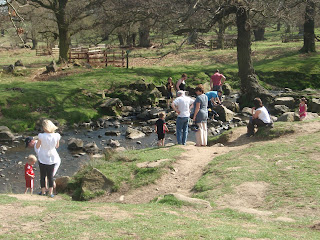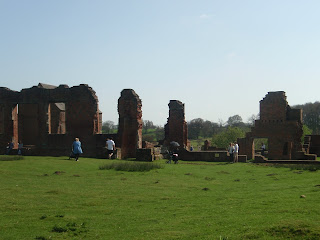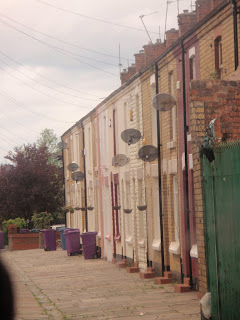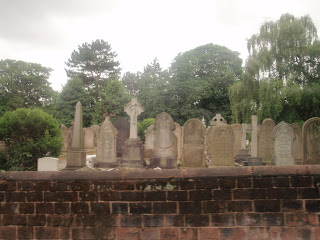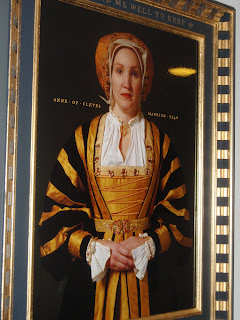Since it's Halloween I wanted to write a little about the tradition, and some additional traditions in England. Halloween actually came from this part of the world. Around two thousand years ago the Celts, Irish and Welsh celebrated their New Year on November 1. So they celebrated the end of their year (and the end of summer) with a festival called Samhain on the night before. The people lit bonfires and wore costumes to ward off ghosts. (The upcoming long winter would cause many deaths to livestock and the people so warding off the spirits had real meaning for these Pagan Celtics.) Over the next several hundred years Christianity spread through the country. The Christian church did not like a festival with Pagan roots practiced by Christians. In 835 AD Pope Gregory IV declared November 1 All Saints Day to honor dead church saints and martyrs. All Saints Day was also known as All Hallows or All Hallowmas (Hallowmas is Old English for All Saints Day). The church did not succeed in overshadowing Samhain. Many Pagan traditions of dressing up, bonfires and parades were still practiced. Since Samhain was practiced on the night before November 1, the celebration was known as All Hallows Eve, and later called Halloween.
The carving of jack-o-lanters derived from England, Scotland and Ireland's custom of carving turnips into lanterns as a way of remembering the souls held in purgatory. But immigrants to North America used the pumpkin as it was readily available and much bigger making it easier to carve then a turnip.
The Halloween as we know it pretty much happened in America. It was there where children dressing up and trick-or-treating became huge. Stores quickly picked up on it and now it is a major source of retail dollars. So while the tradition of bonfires and parades continued here in England, it didn't grow like it did in America. By the 20th century even though it originated as a UK holiday it became largely American.
In 1605 something happened in England that gave them their number one celebration for the fall season. Guy Fawkes was among a group of Catholics who plotted to kill King James I and all of parliament on November 5, 1605. They felt the king was not sympathetic to their cause. Their plan was to set off a huge load of explosives that were being hidden in a cellar beneath the House of Lords. Guy Fawkes was in hiding there keeping watch over the gunpowder stash. An anonymous letter was received and Westminster Palace was searched by the authorities early in the morning of November 5. Fawkes was discovered and over the next few days was tortured until he broke and then hanged. Torture back in those days was atrocious. There is proof of his horrible torture in the contrast of the elegant, confident calligraphy of his signature before the torture and the feeble scrawl which was all he could manage after his body had been broken on the rack.
The discovery of the plot saved England from severe consequences. First of all the country could well have become Catholic, something the members of the Church of England would have despised. The other even more serious catastrophe was that on the day of the state opening of parliament, almost the entire elite of the nation would have been there: kings, lords and commons, and all the senior officers of the church, military and the state. With the explosion of the gunpowder, virtually the whole of the nation's establishment would have been taken out. And since most of the neighboring buildings were made of wood, a large part of the capital would also have been destroyed.
So the night of November 5 is called Guy Fawkes night or Bonfire night. It has been an annual celebration since then as a day when a terrifying plot against the country and government was foiled. Effigies of the villain Guy Fawkes are burned at many bonfires. Fireworks are big on that night also. Let me tell you the fireworks we heard on November 5 last year were HUGE compared to what we heard on Halloween
There are also songs and poems written about that time. Here is a popular one:
Remember remember, the fifth of November
Gunpowder, treason and plot.
I see no reason, why gunpowder treason
Should ever be forgot.
Guy Fawkes, Guy Fawkes, t'was his intent
To blow up King and Parliament.
Three score barrels were laid below
To prove old England's overthrow.
By God's mercy he was catch'd
With a darkened lantern a burning match.
So, holler boys, holler boys, let the bells ring.
Holler boys, holler boys, God save the King.
Hip hip hooray!
Hip hip hooray!
A penny loaf to feed ol' Pope
A farthing cheese to choke him
A pint of beer to rinse it down
A faggot of sticks to burn him
Burn him in a tub of tar
Burn him like a blazing star
Burn his body from his head
Then we'll say ol' Pope is dead
Hip hip hooray!
Hip hip hooray!
Whether we like it or not America is very much a trend setter to other countries. I have heard so many people tell me that their dream is to go to America or live in America. It comes from young people a lot. I've heard people who maybe had an opportunity (through family for example) to go there and for one reason or another didn't. They view it as the mistake of their life. People that can afford it holiday there and come back raving about it. I can understand it though. Compared to here America is bigger and brighter. Buildings, streets, shopping malls, hotels, houses, parking lots, restaurants on every corner and on and on. Of course it is, it's newer and we have so much more space. But one of the things I love about England is the quaint small villages and the unspoiled old castles and manor houses. Just down our main street of our village is the ruins of an old castle from the 1400's!! You can't get that in America. The people here are used to it though, just as we're used to the United States.
But I digress. What I meant to say is that America's exuberance for Halloween is catching on here and it seems to be growing each year. More and more children are starting to trick-or-treat and retail outlets are finding there is a profit in selling Halloween goods. This is only our second Halloween but this is what we hear. This does not go over well with all the Brits though. I was reading an article about Halloween in the paper and a reader from Kent, England wrote in with his opinion on the trend:
"Sorry, but it's eroding our own history and customs. Every year bonfire night gets less and less publicity, and the Hallmark fest that is Halloween gets further and further rammed down our commercialized throats. Bring back the bonfire and Guy Fawkes, and ditch this American rubbish."
That needs no explanation!
Happy Halloween and Happy Guy Fawkes night to all!
To blow up King and Parliament.
Three score barrels were laid below
To prove old England's overthrow.
By God's mercy he was catch'd
With a darkened lantern a burning match.
So, holler boys, holler boys, let the bells ring.
Holler boys, holler boys, God save the King.
Hip hip hooray!
Hip hip hooray!
A penny loaf to feed ol' Pope
A farthing cheese to choke him
A pint of beer to rinse it down
A faggot of sticks to burn him
Burn him in a tub of tar
Burn him like a blazing star
Burn his body from his head
Then we'll say ol' Pope is dead
Hip hip hooray!
Hip hip hooray!
Whether we like it or not America is very much a trend setter to other countries. I have heard so many people tell me that their dream is to go to America or live in America. It comes from young people a lot. I've heard people who maybe had an opportunity (through family for example) to go there and for one reason or another didn't. They view it as the mistake of their life. People that can afford it holiday there and come back raving about it. I can understand it though. Compared to here America is bigger and brighter. Buildings, streets, shopping malls, hotels, houses, parking lots, restaurants on every corner and on and on. Of course it is, it's newer and we have so much more space. But one of the things I love about England is the quaint small villages and the unspoiled old castles and manor houses. Just down our main street of our village is the ruins of an old castle from the 1400's!! You can't get that in America. The people here are used to it though, just as we're used to the United States.
But I digress. What I meant to say is that America's exuberance for Halloween is catching on here and it seems to be growing each year. More and more children are starting to trick-or-treat and retail outlets are finding there is a profit in selling Halloween goods. This is only our second Halloween but this is what we hear. This does not go over well with all the Brits though. I was reading an article about Halloween in the paper and a reader from Kent, England wrote in with his opinion on the trend:
"Sorry, but it's eroding our own history and customs. Every year bonfire night gets less and less publicity, and the Hallmark fest that is Halloween gets further and further rammed down our commercialized throats. Bring back the bonfire and Guy Fawkes, and ditch this American rubbish."
That needs no explanation!
Happy Halloween and Happy Guy Fawkes night to all!

